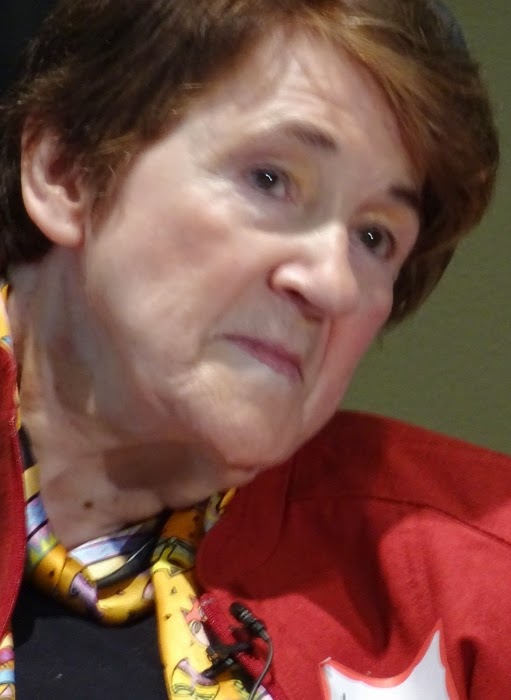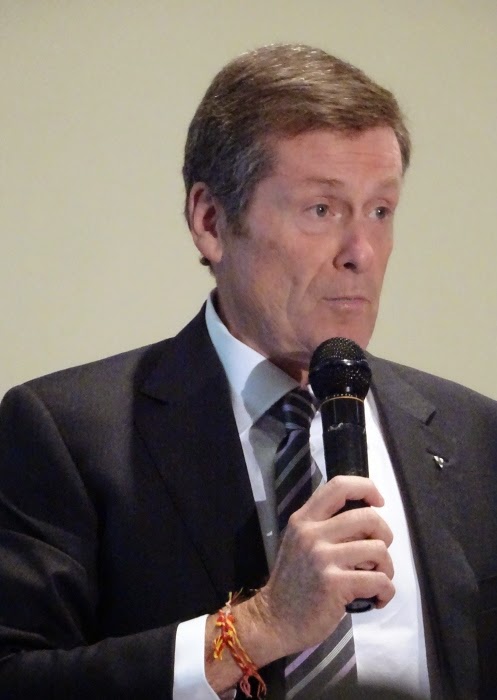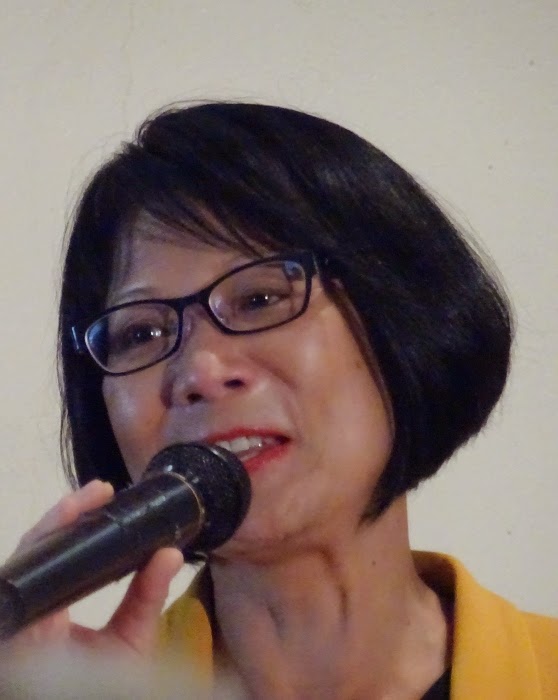Mayoral Debate on Disability Issues
Earlier this week, I attended a mayoral debate on disability issues. For those not familiar with the Toronto political scene, we have a municipal election coming up in about a month and the candidates have been debating up a storm. The main contenders for mayor are John Tory, Olivia Chow, and Doug Ford (taking the place of his brother, Rob Ford). Doug was a no-show on Monday, which was no surprise considering his past statements about people with disabilities. Or maybe this particular part of his constituency just isn’t important to him. Which is a mistake. Given the under-and unemployment of people with disabilities, these are people who have a lot of time to sit around and think. And talk to others. Making a good impression here could make a difference.
Not that I’m opinionated or anything.
The debate was moderated by Helen Henderson, freelance journalist and writer on disability issues.

There were ASL interpreters, deaf intervenors, augmentative communication workers, live captioning, and attendants available for those who needed them. Which made me wonder why at least some of those aren’t available for every debate or City event. Kind of interesting, given that the candidates were there to talk about eliminating barriers for people with disabilities.
There was quite a throng. The Toronto Star estimated 200 attendees in a fairly small auditorium. I overheard one member of the audience wonder why disability events were always held at relatively small venues. Good question, especially considering that wheelchairs take up a lot of room.
Each candidate was given time for an introductory statement and then Henderson asked them questions on four specific areas, after which the audience could ask questions. The candidates had two minutes for each question. Henderson wonderfully instructed them to be specific about their plans, rather than just stating they would refer questions to the City’s Disability Issues Committee, as had apparently happened in the past.
In the opening statement, Tory describe progress as “halting” and committed to annual targets in the next term.

Chow said it was important that the mayor wouldn’t leave anyone behind and emphasized how much could be learned from people with different capacities.

Next came the four questions from Henderson:
Affordable housing and accessibility
Tory stated that there needed to be more effective advocacy to provincial and federal levels of government and he wanted to focus on two areas. One, to repair existing public housing and including targeted percentage of accessible units in those repairs. Two, new affordable housing on public land owned by TCHC and the Parking Authority. His idea was to move these parking lots underground and build affordable housing on the land. He also specifically focused on housing for people with mental illness.
It was interesting that both candidates didn’t seem aware of the already-exisiting rates for accessible units (10% now, going up to 15% in January, 2015)
Employment
Tory wanted all phases of City employment to meet AODA standards, to set targets for employment, and to engage with private sector prganizations known for excellence in employment of and services for people with disabilities (e.g., TD Bank) for examples of best practices.
Chow felt that any endeavor that use City funds (e.g., contractors) should be mandated to hire people who live in the city, including people with disabilities, First Nations, and youth.
Transit
Chow emphasized that the deadline had to be met and the City couldn’t break the law. She also felt that this delay was due to the plans for subway in Scarborough and took the opportunity to mention her vision for a Scarborough LRT, which would cost less and be finished sooner. She felt that the money saved by this could be used to bring the TTC up to accessibility standards.
Tory states it’s important to move the busiest subway stations up on the priority list to remove barriers to travel for people with disabilities and seniors. He also took an irritated swipe at Chow, stating that she had spent the subway savings three times over in there is debate over the city. I don’t know if that’s true, but it was nice to see one of the candidates break out of the smooth performance.
Preventing discrimination and prejudice.
Tory mused about laws having time frames that were too long, leading to nothing being done for years and ending in a rush to finishing by the deadline. He committed to consulting with those who had experience with prejudice and discrimination and wanted better information for the public about barriers to people with disabilities.
Chow felt that the Disability Issues Committee should be involved in consulting with the community and that there should be an annual evaluation of how the City was doing. This would lead to an accountability measure and action plan
There were many questions for the candidates. Clearly, the disability community is an engaged and opinionated one. It’s a pity that this community is mostly forgotten when it’s not an election year.
Walking out of the event, I had one clear thought: that now I know why Olivia Chow is losing. From everything I’ve heard about her, she excels in the day-to-day work of being a politician. She is innovative and collaborative and has just the healing touch City Hall needs after the last four tumultuous years. But she sucks at selling herself. Within a very short time, I knew exactly what John Tory stood for. In fact, I tweeted a few things during the debate and could easily sum up the three main points of his platform (consultation with the community, set targets, involve private sector). It took me a long time to sum up Olivia Chow’s platform., but I eventually settled for “inclusive, City contractors must be representative of the community and ‘get it done’” (her apparent motto).
Another thing that impressed me about Tory was his repeated commitments to setting targets starting in his first year, should he become mayor. He was also very opinionated about the actions of the Harris government’s closing of large mental health institutions in the 1990s without following it up with housing for those who have a psychiatric disability, calling it “a scandal of which we should all be ashamed.”
This is not to say that Chow appeared any less committed. She had a very matter-of-fact approach to the issues of lack of accessibility, returning more than once to the point that eliminating barriers is the laws, so let’s just do it (would that more politicians did that). She commented a few times on things that she was already doing to remove barriers (e.g., her business card is also in braille). She gave me the impression of being someone who has already been doing this for a while.
And maybe that’s the crux of why I walked away feeling like there was something missing from Olivia Chow’s presentation. She seems to run on her record, which by all estimations is an impressive one. The problem is that she is not running in her old riding, she is running in the riding of Toronto. Most of the citizens in Toronto don’t know her record. Tory understands that he needs to present himself in a clear, easy-to-summarize way and as a veteran politician and broadcaster, he knows how.
Although I’m rooting for Olivia Chow, I wouldn’t be surprised if John Tory becomes our next mayor. I do wish that Chow would give him more of a run for his money, though. Maybe she should hire Kathleen Wynne’s campaign manager. That could even help her win.
1 Comment
Read More
Discover what else I've been writing about...
















Wow! That's quite the wrap-up. I caught a bit of the coverage on tv, but you're much more thorough.
Before Olivia Chow officially entered the race, I was somewhat supportive. And with John Tory, I wondered just how many times he can lose elections before he stops running for office.
Once the campaigns got going, well, any support I had for Chow has disappeared. I truly do not know what her plans are for just about anything. Even when she 'answers' questions, she doesn't really answer them. She just spouts cliches. It's like watching interviews with athletes and coaches, 99% of whom give the same pat answers for everything.
With Tory, he seems much more comfortable with this campaign than his previous campaigns. Also, as I keep telling people, he's not really much of a conservative. He's always been a red Tory, which is why his own party ran him out of office.
If I had a vote in Toronto, I wouldn't hesitate to vote for Tory.